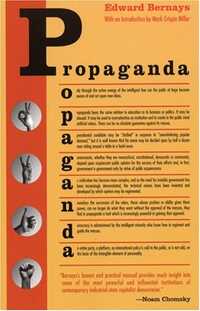
Propaganda
Chapter 11
The Mechanics of Propaganda
- Author :: Edward Bernays
- Publication Year :: 1928
- Posted: September 1, 2024
Important
Very important
Chapter 11 - The Mechanics of Propaganda
page 144:
-
There is no means of human communication which may not also be a means of deliberate propaganda because propaganda is simply the establishing of reciprocal understanding between an individual and a group.
-
The important point to the propagandist is that the relative value of the various instruments of propaganda, and their relation to the masses, are constantly changing. If he is to get full reach for his message he must take advantage of these shifts of value the instant they occur. Fifty years ago, the public meeting was a propaganda instrument par excellence. To-day it is difficult to get more than a handful of people to attend a public meeting unless extraordinary attractions are part of the program. The automobile takes them away from home, the radio keeps them in the home, the successive daily editions of the newspaper bring information to them in office or subway, and also they are sick of the ballyhoo of the rally.
page 145:
-
Instead there are numerous other media of communication, some new, others old but so transformed that they have become virtually new. The newspaper, of course, remains always a primary medium for the transmission of opinions and ideas—in other words, for propaganda.
-
Today the instruments have shifted to the digital landscape. Influencers specifically, but social media in general, have become the tip of the spear when it comes to disseminating propaganda. Podcasts, Youtube channels, and the like may fall outside of social media, but they are also part of the same digital propaganda vectors. Finally we have streaming services, that are largely replacing television, that are a third, less changed, prong in the propagandists array of weapons.
-
As an interesting side note here: Bernays great nephew, Marc Bernays Randolph, is the co-founder and first CEO of Netflix.
-
It was not many years ago that newspaper editors resented what they called “the use of the news columns for propaganda purposes.” Some editors would even kill a good story if they imagined its publication might benefit any one. This point of view is now largely abandoned. To-day the leading editorial offices take the view that the real criterion governing the publication or non-publication of matter which comes to the desk is its news value. The newspaper cannot assume, nor is it its function to assume, the responsibility of guaranteeing that what it publishes will not work out to somebody’s interest.
-
There is hardly a single item in any daily paper, the publication of which does not, or might not, profit or injure somebody. That is the nature of news. What the newspaper does strive for is that the news which it publishes shall be accurate, and (since it must select from the mass of news material available) that it shall be of interest and importance to large groups of its readers.
-
While it is reasonable to expect that some news might help or harm certain parties, the newspapers of today seem to have no qualms publishing only that which fits the narrative they have crafted for their audience. Even today (2024), years after Trump’s first successful presidential campaign, you can still see the “Russian collusion” and “Russian hackers” stories that have been completely falsified still rear their ugly heads now and then.
-
When Twitter was a echo chamber of liberal thought the news agencies lauded it. When Musk bought it and made it more balanced the same news agencies decried “the death of democracy."
-
The problem isn’t that this or that news might help or hurt someone. The problem is the news agencies get to pick and choose which stories are published. If a story supports their narrative it gets published, even if it might not be noteworthy or even accurate. On the other hand a bombshell story might be ignored because it paints the “wrong” picture.
-
In its editorial columns the newspaper is a personality, commenting upon things and events from its individual point of view. But in its news columns the typical modern American newspaper attempts to reproduce, with due regard to news interest, the outstanding events and opinions of the day.
-
Again, news interest is no longer even remotely relevant. The reproduction is the opinions not of the day, but of the audience. The goal is to create an echo chamber where nothing is question and everything is taken as fact.
page 146:
-
It does not ask whether a given item is propaganda or not. What is important is that it be news. And in the selection of news the editor is usually entirely independent. In the New York Times—to take an outstanding example—news is printed because of its news value and for no other reason. The Times editors determine with complete independence what is and what is not news. They brook no censorship. They are not influenced by any external pressure nor swayed by any values of expediency or opportunism.
-
This is laughable in 2024. The NYT is a joke of a newspaper. A modern day Pravda. It parrots the establishment talking points. It censors like a duck to water. It is certainly pressured and swayed and acts strongly opportunistic when given the chance.
-
If the public relations counsel can breathe the breath of life into an idea and make it take its place among other ideas and events, it will receive the public attention it merits. There can be no question of his “contaminating news at its source.” He creates some of the day’s events, which must compete in the editorial office with other events. Often the events which he creates may be specially acceptable to a newspaper’s public and he may create them with that public in mind.
-
Here we see how nonchalantly Bernays talks about how the propagandist creates events and he may specifically tailor these events to a newspaper’s audience. This might be seen today in the Tik-Tok and Youtube shorts style videos that are created to cater toward a particularly low attention audience. You might host an event and create many short videos to promote it. Again, this isn’t in and of itself a bad thing. Someone may be hosting a convention and this would be a way to spread word about it. Nothing wrong with that. But, when we apply it to political and culture ideas a deluge of short videos can literally change the course of a nation.
-
The propagandists might create a series of videos that garner attention. These videos may be promoted by the Youtube and Facebooks of the world (hand-in-glove with the propagandists). Next, regular people might make videos emulating those “successful” propaganda videos. Before long the genie is out of the bottle and the memes are changing culture.
page 147:
-
The source of the news offered to the editor should always be clearly stated and the facts accurately presented.
-
Another ship that has sailed ages ago. Today we get flat out lies and “anonymous sources within the organization”.
-
The situation of the magazines at the present moment, from the propagandist’s point of view, is different from that of the daily newspapers. The average magazine assumes no obligation, as the newspaper does, to reflect the current news. It selects its material deliberately, in accordance with a continuous policy. It is not, like the newspaper, an organ of public opinion, but tends rather to become a propagandist organ, propagandizing for a particular idea whether it be good housekeeping, or smart apparel, or beauty in home decoration, or debunking public opinion, or general enlightenment or liberalism or amusement. One magazine may aim to sell health; another, English gardens; another, fashionable men’s wear; another, Nietzschean philosophy.
-
This is a more accurate description of our modern “news” landscape. Each publication has its own biases and propagandizes to and from that position.
page 148:
-
The lecture, once a powerful means of influencing public opinion, has changed its value. The lecture itself may be only a symbol, a ceremony; its importance, for propaganda purposes, lies in the fact that it was delivered. Professor So-and-So, expounding an epoch-making invention, may speak to five hundred persons, or only fifty. His lecture, if it is important, will be broadcast; reports of it will appear in the newspapers; discussion will be stimulated. The real value of the lecture, from the propaganda point of view, is in its repercussion to the general public.
-
The radio is at present one of the most important tools of the propagandist. Its future development is uncertain.
page 149:
-
Newspapers have recognized the advertising potentialities of the companies that manufacture radio apparatus, and of radio stores, large and small; and newspapers have accorded to the radio in their news and feature columns an importance relative to the increasing attention given by the public to radio. At the same time, certain newspapers have bought radio stations and linked them up with their news and entertainment distribution facilities, supplying these two features over the air to the public.
-
Using the old media, newspapers, to promote the new media, radios, does not feel like propaganda to me. Yes, they are pushing a new product, but I think things like radio and television and the internet are such massive game changers that people would have naturally adopted them. You don’t need to propagandize people into brushing their teeth when they can see the results of those around them and you don’t need to propagandize people into using these new forms of communication.
-
Large groups, political, racial, sectarian, economic or professional, are tending to control stations to propagandize their points of view.
-
And already, from the early days, monopolies grew up around radios. (and newspapers and television and internet…)
page 150:
-
The American motion picture is the greatest unconscious carrier of propaganda in the world to-day. It is a great distributor for ideas and opinions.
-
The motion picture can standardize the ideas and habits of a nation. Because pictures are made to meet market demands, they reflect, emphasize and even exaggerate broad popular tendencies, rather than stimulate new ideas and opinions. The motion picture avails itself only of ideas and facts which are in vogue. As the newspaper seeks to purvey news, it seeks to purvey entertainment.
-
This is still only partially true. The movies are still certainly pushing propaganda, but they are A.) no longer the greatest carrier of propaganda (that is social media/internet) and B.) they most certainly can stimulate new ideas and opinions alongside standardizing existing habits of a nation.
-
I used to argue that TV (in all its flavors) was the most destructive invention mankind has ever known. Now, I would say that internet/social media is on the way to supplanting TV. In both cases I think the destruction wrought is greater than all history’s wars put together. By sapping hours (screen time per day is about 7 hours) every day, people never reach their full potential. Also it lends to the sedentary life that comes with all its own physical and mental ailments. While the wounds of war are more explicit, the wounds of TV are more subtle and seemingly neverending.
-
Another instrument of propaganda is the personality. Has the device of the exploited personality been pushed too far? President Coolidge photographed on his vacation in full Indian regalia in company with full-blooded chiefs, was the climax of a greatly over-reported vacation. Obviously a public personality can be made absurd by misuse of the very mechanism which helped create it.
-
Yet the vivid dramatization of personality will always remain one of the functions of the public relations counsel. The public instinctively demands a personality to typify a conspicuous corporation or enterprise.
-
We can see that this has gone much further than Bernays might have imagined. Today celebrities will do much more to stay in the spotlight than dress up in Indian regalia (although today dressing that way would be non politically correct - cultural appropriation).
page 151:
-
There is a story that a great financier discharged a partner because he had divorced his wife. “But what,” asked the partner, “have my private affairs to do with the banking business?” “If you are not capable of managing your own wife,” was the reply, “the people will certainly believe that you are not capable of managing their money.” The propagandist must treat personality as he would treat any other objective fact within his province.
-
This would almost never happen today for this reason, although we do “cancel” people for wrongthink or past actions that were not taboo then but are taboo now. There seems to be little rhyme or reason to who is canceled. Trudeau dressed up in “black face” and was not cancelled (I suspect because he tows the globalist line) while comedians are sometimes cancelled for jokes they made years earlier.
-
A personality may create circumstances, as Lindbergh created good will between the United States and Mexico. Events may create a personality, as the Cuban War created the political figure of Roosevelt. It is often difficult to say which creates the other.
-
There are a multitude of other avenues of approach to the public mind, some old, some new as television.
page 152:
-
The school may disseminate information concerning scientific facts. The fact that a commercial concern may eventually profit from a widespread understanding of its activities because of this does not condemn the dissemination of such information, provided that the subject merits study on the part of the students. If a baking corporation contributes pictures and charts to a school, to show how bread is made, these propaganda activities, if they are accurate and candid, are in no way reprehensible, provided the school authorities accept or reject such offers carefully on their educational merits.
-
I think this is a slippery slope. The charts might be perfectly reasonable, but placing the, essentially, advertisement in the school rubs me the wrong way. It would potentially create a market where companies were competing to get such prime advertising real estate. They would push the envelope with what they could get away with - less educational, more entertaining. In this race to the bottom, the students would be merely an afterthought next to the profit seeking.
page 152:
- Undoubtedly the public is becoming aware of the methods which are being used to mold its opinions and habits. If the public is better informed about the processes of its own life, it will be so much the more receptive to reasonable appeals to its own interests. No matter how sophisticated, how cynical the public may become about publicity methods, it must respond to the basic appeals, because it will always need food, crave amusement, long for beauty, respond to leadership.
page 153:
-
If the public becomes more intelligent in its commercial demands, commercial firms will meet the new standards. If it becomes weary of the old methods used to persuade it to accept a given idea or commodity, its leaders will present their appeals more intelligently.
-
I think the need for food, craving entertainment, etc are borderline ridiculous excuses when used to justify why the public “must respond to the basic appeals” of propaganda. I walked away from TV and movies over a decade ago and never adopted social media in the first place. I don’t feel like my life is lacking in any way because of this. By having that extra 7 hours a day, for me it was probably 3-4, one can do whatever one wants. If you use TV/social media when you are bored, you simply need to find something that stokes your interest. I read non-fiction, exercise, and play a little video games (a lesser vice). You’d be surprised at what even 1 hour a day dedicated to a goal can produce in a matter of a month.
-
Propaganda will never die out. Intelligent men must realize that propaganda is the modern instrument by which they can fight for productive ends and help to bring order out of chaos.
-
Bernays ends with a final jab at the intelligent/unintelligent men and then eerily comments on the bringing order out of chaos. This is the English translation of a predominant Latin Freemason saying: Ordo Ab Chao. This goes into “deeper” conspiracy theories, but when we look at the chaos the world has been in, probably since before Bernays writing this, and see how a number of organizations are trying to bring their style of order (via propaganda) to it you might get the feeling that there is some manipulation going on.
-
For example, I would argue that the United Nation, NATO, and the BRICS are jockeying (maybe even working together) for regional control of the world. Consider how the EU has “forced” its member countries to accept wholesale the immigration that is pulling their countries apart at the seams. The people clearly don’t want this, yet it continues and spreads chaos to first weaken the nation and finally allow for a solution (and order) to be put in place that might have never been acceptable prior to the migrant crisis. We saw the same thing on a truncated timeline during Covid. The chaos of the pandemic led to all sorts of changes that would have been impossible otherwise (super fast “vaccine” deployment, work from home/school, shutting down mostly mom and pop stores, etc).
-
Eventually I suspect that they want a global culture to replace national cultures. I won’t go into this now, but it is striking the Bernays uses such a phrase to punctuate the very end of this kind of book.




